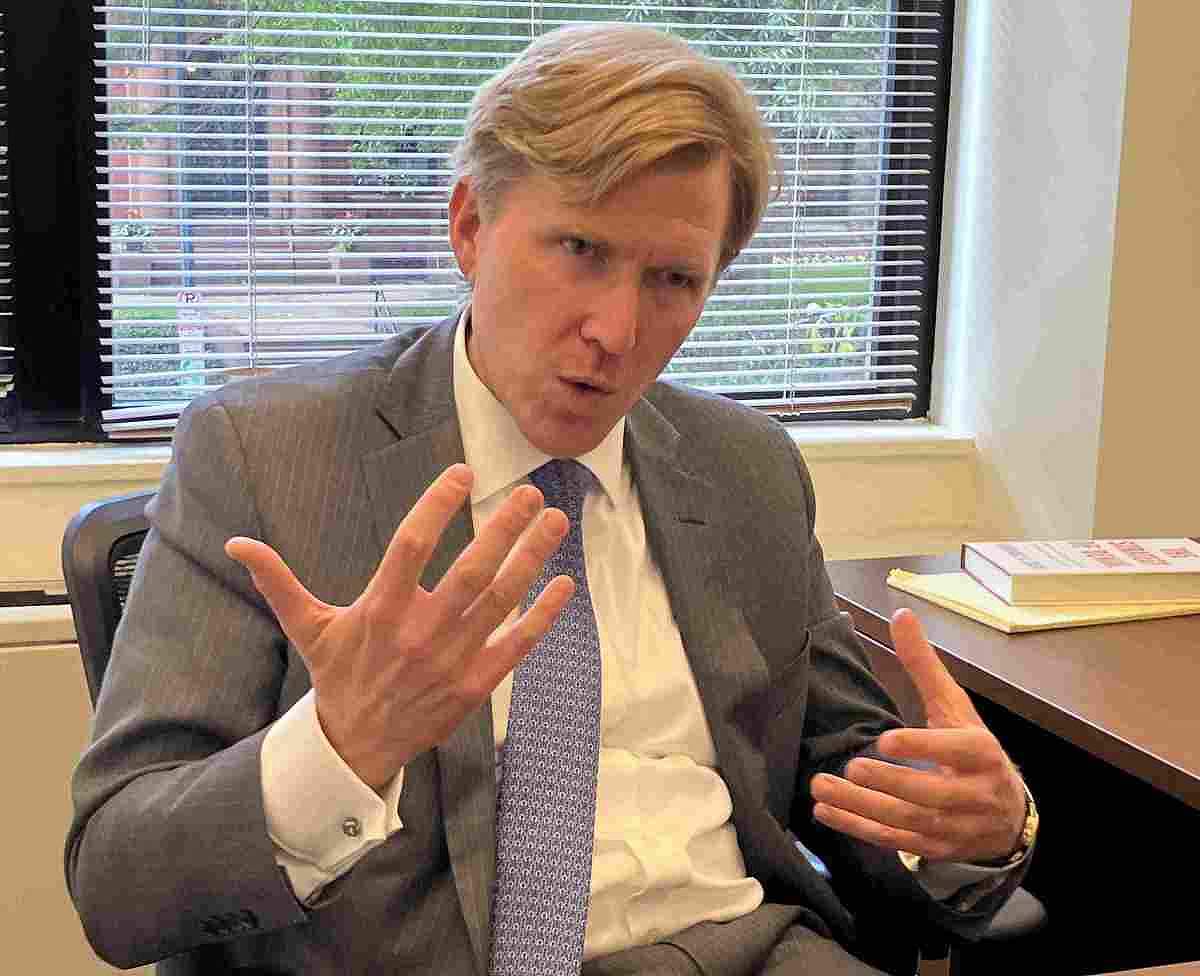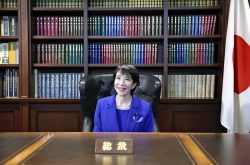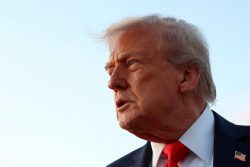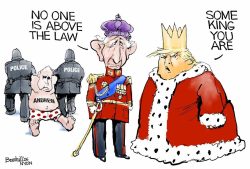Former Trump Aides Differ on U.S. Intl Engagement; But Elbridge Colby, Matt Pottinger Both Share Concern Over Taiwan

Elbridge Colby, former U.S. deputy assistant defense secretary, speaks during an interview in Washington on May 30.
7:30 JST, June 8, 2024
WASHINGTON — The Yomiuri Shimbun recently interviewed Elbridge Colby, a potential candidate for a key diplomatic or security post if former U.S. President Donald Trump is reelected, as well as Matt Pottinger, who led China policy as deputy national security adviser in the former Trump administration.
The interviews, conducted separately, highlighted the differences in the views between the two outspoken Republicans on U.S. involvement in the world.
Colby’s appointment if Trump should win has been rumored because his thinking overlaps with Trump’s cost-conscious policy. Pottinger, meanwhile, resigned after the storming of Congress in 2021 and is thought to be keeping his distance from Trump.
The following texts are excerpted and edited from their interviews.
Colby: China is ready to fight
The Yomiuri Shimbun: How do you see the situation in the world?
Elbridge Colby: I think the situation is exceptionally dangerous. I don’t think it’s an exaggeration to use the term that Winston Churchill used, which was the “world crisis.” While there is a war going on in Europe, and there are several wars going on in the Middle East, there is a potential for a war to break out, most significantly centered on Taiwan, but also potentially on the Korean Peninsula concurrently. And neither the United States nor Japan, and certainly not Taiwan, are prepared for that conflict.
In the United States and in Japan, there is still a tendency to look at the world through an idealistic lens. But, the Chinese are more powerful, and I think there is a very real possibility of a war breaking out.
The fiscal situation in the United States is very difficult. There are significant fiscal constraints on defense, and there’s a war-weariness in this country. But, there is no matching the military buildup or the focus that would be needed.
Yomiuri: How do you analyze the Chinese military’s capabilities and possible aggression in Taiwan?
Colby: They are building the capabilities to not only attack the island of Taiwan but also to confront the United States and allies like Japan at the same time. They’re building up their nuclear forces. The only real reason for that would be because they think they might get into a large war with the Americans.
How ready are the Japanese Self-Defense Forces? And how ready are the Americans for a peer fight? Our readiness is at historic lows. We need to have conventional forces that can deny along the first island chain and then nuclear forces that can match the Chinese if they decide to escalate. The rational best course [for unification with Taiwan from China’s perspective] is invasion. We have to be ready now.
Yomiuri: Taiwan has been vocal about supporting Ukraine.
Colby: It exhibits an almost suicidal lack of focus on their own [situation]. Taiwan needs to be as well armed as possible.
The United States has limited resources. So, like a company, we have to pick a strategy.
I support Ukraine’s cause from a moral point of view. We’ve already given Ukraine $170 billion. We’ve given them a ton of weapons, and the situation is not going well. So, my view is — President Trump said this, too — “Let’s get the Europeans to step up.”
My biggest complaint with the Japanese government, in addition to not actually moving fast or hard enough on the defense front, is Japan is going along with this focus on Ukraine. China’s long-term goal is to break Japan off from the U.S. alliance and force it to become a kind of a tributary state in a modern context.
Yomiuri: How are your ideas different from “America first” and “isolationism”?
Colby: My view is very consistent with what I understand “America first” to be, now. My proposed policy is the one that puts Americans first. And it’s not isolationism. You have to be prepared to fight war if you’re going to have peace.
(The interview was conducted on May 30 in Washington.)
Pottinger: Avoid isolationism

Matt Pottinger
The Yomiuri Shimbun: What do you think about the current situation in the Taiwan Strait, especially after China conducted large-scale military drills in May?
Matt Pottinger: The point the Chinese military, and its paramilitary forces like the coast guard, are trying to demonstrate is that they have the ability to choke off Taiwan at will and to make it, in the words of one mainland Chinese commentator, the Dead Island. The threat to the status quo in the Taiwan Strait is really coming from Beijing.
Yomiuri: If former President Donald Trump wins this year’s election, would his administration perform better than the administration of current President Joe Biden?
Pottinger: There were no new wars that occurred on President Trump’s watch. What we have to do is ensure that the Republican Party does not turn inward and begin shifting towards a more isolationist set of instincts.
[Isolationism in the 1930s led to] lessons that were written in blood in the 20th century. Keep them in mind, keep them in our hearts and maintain an internationalist Republican foreign policy of peace through strength, and recognize that if the United States doesn’t lead, there’s not going to be another democracy that steps up to do that for us. It’s going to end up being totalitarian dictatorships that take charge of the world.
Yomiuri: If you are asked to join the second Trump administration, would you accept the offer?
Pottinger: We are now in a period of global crisis, and I’m always at the service of an elected president of the United States, whoever he or she may be.
(The interview was conducted online on May 28.)
Top Articles in World
-

Israeli Ambassador to Japan Speaks about Japan’s Role in the Reconstruction of Gaza
-

Videos Plagiarized, Reposted with False Subtitles Claiming ‘Ryukyu Belongs to China’; Anti-China False Information Also Posted in Japan
-

North Korea Possibly Launches Ballistic Missile
-

Chinese Embassy in Japan Reiterates Call for Chinese People to Refrain from Traveling to Japan; Call Comes in Wake of ¥400 Mil. Robbery
-

Pentagon Foresees ‘More Limited’ Role in Deterring North Korea
JN ACCESS RANKING
-

Japan PM Takaichi’s Cabinet Resigns en Masse
-

Japan Institute to Use Domestic Commercial Optical Lattice Clock to Set Japan Standard Time
-

Israeli Ambassador to Japan Speaks about Japan’s Role in the Reconstruction of Gaza
-

Man Infected with Measles Reportedly Dined at Restaurant in Tokyo Station
-

Man Infected with Measles May Have Come in Contact with Many People in Tokyo, Went to Store, Restaurant Around When Symptoms Emerged






















